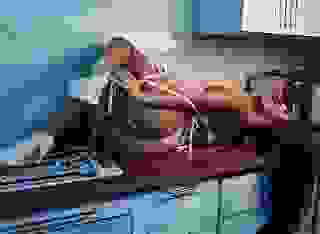Note: You can change font size, font face, and turn on dark mode by clicking the "A" icon tab in the Story Info Box.
You can temporarily switch back to a Classic Literotica® experience during our ongoing public Beta testing. Please consider leaving feedback on issues you experience or suggest improvements.
Click hereI fired Nancy for violating her anonymity pledge with us, cancelled the contract with Zenger Free Publishing (every author and book were a separate contract, so we could handle these things individually), and the suit dropped us because we fired Nancy, terminated Barb's contract, and their meetings were obviously consensual. We changed our policy, now forbidding personal chats online with clients and always the exchange of pictures; physical contacts had to be approved. Our anonymity protected us. The only time I met Barb Smith was at Zenger when I visited to explain the termination.
Zenger cancelled its relationship with Barb, also, later that day. I don't know if the book has been published.
"Occasionally you have to be tough. Mo's still learning when that is. She's never dealt with others that way," she said. "She encourages. Sometimes relationships must end. Mo is the first one to mention when she thinks her age and appearance might not be to advantage."
"I hate to see you cutting back, Sharon," I said. "But I look forward to the job. Will I have acquisition authority?" I wanted to be able to choose our work, to be able to say we'll work on this book but not that one.
"Yes. Emphatically. Why do you think I've been sending you all those manuscripts to dole out to editors? You questioned several, and in every case it was a good decision. Now you'll just get paid for it. Oh, and I still own the company, so don't mess it up." She smiled, but I thought there was an edge of the serious there.
"I've been openly preparing you, Kyle," she said. "You know all but the last two editors I hired. You'll meet them at the next company meet. You know all the companies we work with. They know you. They approve you as my replacement, heartily."
I was slightly surprised that she'd floated me to our associates. I said, "I know I'm young for such a position in a growing company. I am touched by your faith in me."
She seemed hesitant then. "Mo's become your friend, I know. You two make a good team," she said. "How would you like to employ her?"
I nodded. "I've never heard a thoughtless statement from her. She was so smart to advise Katudnik to change the climax of his novel into a flashback at the end. He had a block about where to take the book to finish."
She nodded. "It was smart." The book was nominated for several awards, and Katudnik was being courted by some large publishers. I hoped he'd stay with Zenger and us, but their contract was only for the one book. Zenger hired us to edit Katudnik.
Mo was such an unusual person, but such a talent. We didn't want to slight her.
I said, "All the authors like working with her, although one or two refused to take any advice. They were usually transferred to me. Do you think she'd like to be a troubleshooter? You know how we're getting some recalcitrant authors? She's very good at mollifying them. I think they can't believe she's got a Phd and has some authority. Or that she's old enough. For someone with limited social background, she's very good at persuading someone who has spent months or years writing something to change something fundamental."
"I think she might like it unless it's always a recalcitrant," Sharon said, looking me directly in the eye. She wanted me to handle some of those, clearly.
"What kind of family life does she have? I see her at these workshops three or four times a year, but we usually only talk about our work," I inquired. "I literally know nothing about her."
Sharon was smiling. "Hah! You know her parents and I go way back. Her dad teaches music and coaches voice. Her mom's a professor in psychology. In her advanced academic ability, she's sacrificed much of the normal socializations. She's not been to a prom, not a baseball game." Sharon stopped. "She's been so focused on reading, writing, and degrees... Only with our company has she had to grow socially at all. And she's been like a flower. She has a talent for working with people."
She liked talking about Mo. "Her adolescence was spent living with my husband and me, going to school with people years older. Her parents say she hasn't had a boyfriend, and when they ask her, she says she's too busy working now. No, no girlfriend either. She has her own apartment, a cat. She has a car. Goes to church, has some commitments there." She shrugged. I thought she wanted to say something but decided not. She acted as if she had an ace up her sleeve. I wondered what that could be.
"Do you mind if I talk to her about all this? I may ask her her goals, that sort of thing. She's too brilliant to hide away in an office at home. Too nice and... pretty to not have a normal life."
"Be my guest. I agree we want to keep her. I don't think she wants to move on, at least yet."
I said, "I talk to her a lot, but she keeps things on business. I've asked about her family and life, but she just shook her head or brings up work."
Sharon actually laughed, nodding at something. "That's Mo. It may change, I think. At least a little. She and I talk about things. Not just work."
We talked about our company until she had to go.
Two hours later, Mo finished with her small group critique and I met her outside the room.
"Lunch, Mo? I'd like to talk," I said.
"Love to," she said. In all the years of working with her, I had probably only had a meal with her when we were leading group discussions or talking about business. It was never just the two of us as friends. She looked genuinely happy to have lunch with me.
Her diminutive, eerily-adolescent prettiness was quite attractive to some men, maybe most. (She certainly must attract the Humberts of the world, I thought sickly. If I ever came to know her on a personal basis, I might ask.) I felt like I was talking to an academically precocious teenager, probably because it prevented me from thinking of her as the young woman she was. I knew a few men made passes at her at various conferences; she said she discouraged them.
We sat and ordered. I filled her in on the general changes coming at PPU. She was not surprised, not anxious, just happy to be included. She was not jealous, that I could see. To so many, a Phd beat a master's, and that was all that mattered.
I told her Sharon had asked me to be Managing Senior Editor. She didn't seem surprised, and she smiled and congratulated me. She saw my reaction: grateful she was a good sport, happy at the new job.
She said first, "I hope you'll keep me on. I've enjoyed the way this company works."
"Of course," I said, "you're our best editor, Mo, and you handle people very well. I'd like you to take on some of the tasks I've had."
I let it be quiet for a moment, and Mo held onto her coffee on the table and looked at me. She wanted to speak; I'd seen that look whenever she had an idea she wanted to discuss. She surprised me with the idea.
"Tell me about Jill," she said. I shook my head at the change of topic. It was personal. I wondered what she was doing. With Mo, there were no casual requests. Everything had a purpose. Everything was thought out ahead of time. I supposed that was a way to get a Phd at 22. My eyes widened a little. "Tell me about growing up with her," she said.
Somehow, I thought I'd been maneuvered. Sharon and Mo wanted me to know her better, so now I was about to learn about our youngest, most brilliant editor.
I talked about Jill and me. I never had to choose a girlfriend or look for one: I had one when I was seven. I was still with her. I talked about playing games, being married to a Marine, our hopes for a family in a few years. I spoke of growing up in Ohio, of having three moms, mentioned some of the fond memories.
"Wow." She was pensive. She sucked on a straw in a Coke. She said, "Jill's a remarkable person." I looked into her eyes, and she did not flinch. She wanted me to see something there.
I looked again.
Eventually, I asked, "Tell me about your life. Do you have a boyfriend?"
"No, not a boyfriend."
I looked at her, and suddenly I apprehended what was in those speckled eyes behind the oval glasses. Her gaze didn't falter. "Don't be coy," I said. I knew she was grown up, despite the smallness, the image of pubescence.
She had an adult conflict in those eyes. She didn't look away. Suddenly, I knew what she wanted me to realize. I smiled. I wondered, am I a dullard?
She smiled. "Kyle, you finally understand, don't you?" she said. She looked at me and then away. It was quiet. "I've not had many boyfriends. I turned down a few. If one comes along who measures up, I'll let you know. You're a tough act to match, though."
I didn't take my eyes off her. All those meetings at conferences, talks on the phone, Ackerman's hesitance to say something. I wondered if Mo were turning guys down, or discouraging them, or just avoiding them, for me.
So I knew. She was forthright and silent.
"I love my wife," I said. Jill was in Okinawa for four more months, at that point. Mo was little and beautiful and her skin was radiant.
"Of course." Mo said it and kept my gaze. "I'm not trying to steal anyone from anyone. I want you to love your wife. I don't want a man who doesn't love his wife."
She knew me. She respected me, and she wanted my marriage to work. "Why are you telling me now?" I asked.
"Because other people can tell how I feel. My mom and I talked about it months ago. I told her about you. She talked to Dr. Ackerman, who guessed I liked you long ago." She was smiling.
"Will it change things?" I asked. "I didn't know."
"I liked... that you held women at arm's length. You discouraged that woman who..." she started but I held up my hand. One woman at a conference had tried to seduce me. I literally had words with her, she was so brazen. Mo had started to laugh when the woman walked away from us as we stood around after the small groups broke up.
"I hope you find someone, Mo," I said.
"Do you know why I'm so small, Kyle?" she asked.
I wondered, how was that connected? Am I being manipulated? I said, "I just assumed it was in your genes."
"It is, but it's a condition. Pituitary. I stopped growing at 12. They caught it, treated it, and I grew a bit more to this height. My breasts are more a suggestion than a reality. I can have kids. But I look damn young. Everything works. I'm just small. And it's proportionate."
She was never without purpose. "Why are you telling me this?" I asked. "It doesn't affect how I feel about you."
"I'm telling you because it's the only secret I have. Dr. Ackerman knows, my parents know, and anyone who looks at me suspects. You know now. I know you love your wife."
We were quiet for a few minutes. Would it be awkward around her?
I said, "Aside from my wife's family, you're my closest friend. I didn't feel like I really knew you, though. I'm glad you told me how you feel. I hope it doesn't change things, but if you need... just let me know if you need things to change. Let me know if you want PPU to follow this path. Let me know if you want to leave. Or me to."
She shook her head with a smile, and said, "I'm not unhappy. I love the work. I like seeing you a few times a year, having your attention everyday, even just for work. This is really the first time we've talked socially, or outside of the job. My mom said that even just working together is a way to fall in love. Love is love."
I was surprised she used the word, used it so matter-of-factly and without hesitation. I didn't think it was a new realization for her. She'd probably been studying her situation for some time, maybe even talked it over with Sharon.
After a moment, she said, "No, I don't like being the unrequited. But until I feel this way about someone else, I prefer to be around you now and again." She waited a moment and smiled. "Maybe I'll convince you that The Thin Red Line is allegory."
I laughed. I didn't know how to handle this role.
I told Jill about my conversation with Mo the next time we talked by phone. She said, "Some guys make passes at me in the Corps. I don't go with any one guy to lunches or dinners. Only a group, and I make it clear I'm married and not interested."
"She didn't really make a pass," I said. "She insisted that things go on like normal. She just hopes to find a guy like me, she said."
Jill was quiet. "She still looks so young? I remember thinking she was so tiny."
"Yeah. I only see her a few times a year."
That was our long separation because of her work in Okinawa. I edited a lot of books. PPU made money. Mo and I became internet friends. I liked seeing her at two more meetings, but we just talked about work.
*
Kyle Franklin narrating
I didn't think anything changed with Mo. She mentioned a few dates with men over the years, but never as if she were serious about someone. I wondered if she was a virgin. I suspected she was. What does that even mean?
PPU grew. We coaxed and encouraged writers when we saw potential, and publishers appreciated our efforts. Agents sent writers to us, hoping to shop their book around to publishers. We occasionally notified an author that some work was not good enough, and publishers were relieved. Katudnik won a Pulitzer, due in some part to a suggestion of Mo's that he reorganize the book. Another author won a Hugo, and several others were on lists for reading.
We were pulling in a lot more money because we were successful.
I took on more and more of Sharon's duties, visiting publishers to arrange contracts, talking to agents, occasionally speaking with authors. We hired a lawyer full time to approve contracts.
Mo became a liaison to the other editors. For some reason, sending her to help a struggling editor or author didn't scare them. People liked her, liked being with her, and wanted her help. Those who had never met her were usually shocked when they did. Occasionally, she referred a case to me. Issues were resolved. She ran up the travel expenses, but we produced some very good books in the long run.
Zenger Free Publishing and we had a special relationship; Sharon was close to their president, and I was on a first-name basis with all their officers and many of their editors. Sharon said with a twinkle in her eye, "We may soon join with them. Nothing's decided yet, and it wouldn't be a classic merger. We'll see."
Mo was thirty, and looked a teenager. I thought she always would.
The Tuesday evening before JIll's deployment leave, Sharon and Zenger's president had me attend a meeting. We discussed Zenger and PPU, and they seemed to have plans made.
Sharon said, "We're going to merge editorial functions. They need you to meet their whole staff. You'll be Editor in Chief; Jerry Mahlerwein over there has cancer and will not be retained, by his request." I knew Jerry, a round man who played Santa Claus at Zenger's Christmas party. And a sharp publisher. I didn't know he was sick.
Zenger had offices in Columbus, Ohio and Raleigh, North Carolina; I'd have to relocate for some months during and after Jill's deployment, but not more than a year. I was looking forward to discussing it with her over her leave. We'd be able to focus on what was best for us, for her career, and for mine. It was time to discuss those children she and I had dreamed about.
I was married to the only woman I ever wanted to love. I thought we were happy. I was sure things could work out.
*
Kyle Franklin narrating
That Tuesday was an eventful day. Jill and I each had a secret. We were excited that evening, in very different ways. For me, opportunities were opening up. For her, things were finally coming together. I intended to disclose my secret at home with her family, and she intended to take hers to the grave.
Neither one of us was successful.
Chapter 9: A Funeral and Personal Effects
Kyle Franklin narrating
A few days after learning of Jill's death, I met with the casualty assistance officers. We sat at the Kinnisons' dining room table and discussed insurance, vacating the house at Camp Lejeune, and all the things that go with a military death. It was obvious that Jill and I had been estranged at her death, but they did not pry. They had a mission, and that did not require understanding the major's personal problems. We prepared for the funeral; it took hours. The body would soon be at Dover Air Force Base in Delaware.
Finally, they were finished. Captain Shehan looked at me.
"Your wife... was young to be a major," he said.
I nodded. "They augmented and promoted her early. She had a talent, and they kept giving her notice."
He nodded. "Probably deep selected early on."
I'd heard that term for those identified with great ability. Jill actually didn't like that idea; she thought there were better ways to determine and prepare the talented.
The younger officer, the first lieutenant, said, "We're so sorry for your loss, sir."
I nodded and said, "I know you are. Thank you." I stood and shook hands with them.
They left, and I sat alone at the table thinking.
It was awkward: the sudden separation right before the deployment, the loss then of her life with so much still in the air. Her death mooted every issue. There would be no divorce. There would be no reconciliation. There was no Jill.
Our life together now became dubious memories. Regardless her heartfelt guilt or remorse, her sexual affair took her across the Rubicon. I wondered if she just liked fucking him more, or if she was in love with him. Could she love two men at once? Why not? But she promised to love only me.
I couldn't forgive her. Not soon, if ever. She crushed me. Fuck you, I thought, sadly. The Marines didn't take a wedding vow. I was counting on her first, most. Forever, or as long as we lived. My claim on Jill was for life and ended only now.
Ayla and her parents came in, then Gil and the girls were about. We watched the children in subdued fashion, not wanting to talk. I envied Gil and Ayla their love. I told them about the Marines' visit, the decisions I made.
Sometimes one of the girls would come over and sit on her mom or dad's lap, and cry. It was that sort of day. I felt welcome, but somehow not part of the family as I had. I guessed Jill had in some way rejected me by choosing another. I missed that feeling of belonging. Gil sat next to me for an hour, talking about his work and the girls and Ayla.
Her body was returned to the country next morning, reaching Sky Grey a few days after that. It was recommended the body not be viewed. There was a sergeant who accompanied the body to us; he had a box of personal effects from Afghanistan and another from Camp Lejeune in a small duffel bag. Everything was transferred to me at the funeral home.
The sergeant had me sign an inventory.
Her personal effects were her identity tags, her wallet, keys no one knew about, and other odds and ends. From Lejeune there were some books, uniform items, her old second lieutenant bars, the contents of her desk. One item made me pause, and I tried to be cool. There was one last letter with my name on the brown envelope. "ONLY Kyle Franklin!" it said in black marker, sealed with two strips of tape. I noticed the tape was unbroken; it was unopened.
There was her personal laptop and power cord that she used at work sometimes, and her phone. That phone.
I knew no Marine's personals were sent without inspection; a decease meant some officer or sergeant had gone through the effects to remove condoms or pornograpy or any item that might cause distress. Letters were skimmed or read, sometimes. I had no illusions. But these effects came from the base, where she'd left her phone. It did not come from her colonel or mates in the Middle East. And no one could get into her phone or laptop.
I stared at her effects. I didn't know what to do.
*
Kyle Franklin narrating
The priest from Merciful God parish visited to discuss the funeral. The Kinnisons and Ayla were with me, and the arrangements were quickly made. Father asked if anyone from the family would like to say some words at the funeral itself. It was not necessary, but a lot of families wanted to do it. Knowing the Kinnisons well, he seemed surprised they did not want to say anything, but no explanation was forthcoming. He looked at me but did not inquire.








